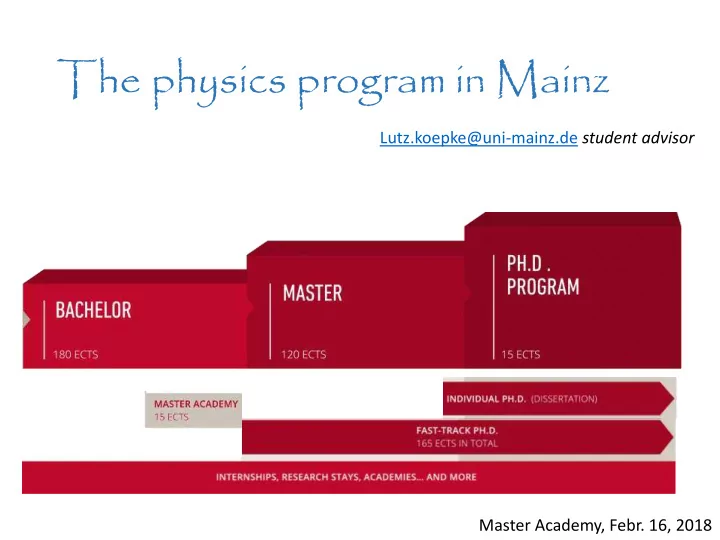

The physics program in Mainz Lutz.koepke@uni-mainz.de student advisor Master Academy, Febr. 16, 2018
The physics program in Mainz You are here
The physics program in Mainz We‘ll talk about this Details in module handbook: https://www.studium.fb08.uni-mainz.de/downloadcenter-physik/
The Master‘s program in thumbnails ….
Some things that may be different from what you are used to … • Physics education in Germany contains experimental, mathematical and theoretical aspects with similar emphasis and avoids early specialization. • Experimentalists teach „experimental courses “, theorists „ theory courses “. Mostly, laboratories are separate modules that are not interweaved with courses. • All classes are accompanied by 1-2 hour tutorials. Typically, 50% of the homework problems need to be successfully completed. Written or oral exams. • Advanced laboratory classes or projecs are considered to be important and have to be taken by all students. • While students have to choose a field outside of physics during the Master‘s , there is a smaller non-physics component than in other countries. • The one year research phase with substantial scientifically contribution is an important ingredient of German Master‘s programs. • Finishing the Master‘s program before the PhD is the „ standard “ mode of operation (a fast track PhD following BSc degree is the exception) • PhD students are considered „ qualified researchers “: while special PhD courses are offered, there is no initial „ teaching phase“nor are there intermediate exams.
Some numbers …. • 1 hour = 45 min! 12-15 weeks per semester • One credit point corresponds to a workload of ~ 30 hours: 8-9 credit points given for a 4 hour class including tutorials • About 30 Master‘s courses per semester, roughly 25 students per semesters Grade Descriptor Description US equivalent 1.0 very good outstanding A 1.3 A German grading system 1.7 A- 2.0 good substantially above average A- 2.3 A- GPA: ~ 1.8 2.7 B+ 3.0 satisfactory still meets the requirements B 3.3 B- 3.7 sufficient below requirement C+ 4.0 C <4.0 failed does not meet requirement
How to make it into the MSc program • Central online application (but certified copies by mail …) • Deadlines (only for physics!): September 1st (for winter term, mid October to mid February) March 1st (for spring term, mid April to mid/end July) • Following recognition (60 € ) and checking of application by admission office, we obtain documents and check if critera of our regulations are fulfilled • Requirements on additional classes may be imposed (27 CP maximally) • Good idea to send me your transcript before application ! Minimal requirements: • 30 CP in experimental physics • 19 CP in laboratory work • 25 CP in theoretical physics • 23 CP in advanced mathematics and calculational methods, as well as • 9 CP for a written Bachelor's thesis (single author)
Structure of the Master‘s program … Structure fixed, but choices can be made in all modules … All classes in English, except for many subsidiary subjects may choose another Physics topic instead
Want more information?
What do we mean by seminars? 8 CP At least two seminars on different research fields scheduled in each semester: • Every Master‘s student has to give 30-45 min talk on a contemporary research subjects • 10-16 talks are given in each seminar that are followed by a discussion among students • Grade depends both on scientific quality (depth, correctness, response to questions ..) and quality of presentation (structure, clarity, presentation style, graphics …) Examples for seminar topics (for particle and nuclear physics): • Gravitational waves: principle and discovery (experimental) • Silicon pixel detectors (technical) • Additional spacetime dimensions (theoretical) similar examples also in quantum physics and solid state physics
What do we mean by laboratory ? 10 CP • Two parts with up to 10 laboratory days in total, about two days per experiment • Emphasis on independent wor k • Second part can be replaced by a project in a research group (may be theoretical) • Two-student teams work on challenging experiments, supervised by assistants • Typically complex data acquisition systems/computer-based analyses used • Graded based on detailed written summary reports
What is a subsidiary subject? 9-15 CP Choose from either: • Chemistry 2 options • Computer Science 4 options • Mathematics 26 options • Meteorology 4 options • Economics 3 options • History of Natural Sciences 2 options • Philosophy 3 options • + indisciplinary class (research visit, language class, history, … 3 CP) Unfortunately, only meteorology and some economics options guaranteed in English → may choose classes from our physics portfolio instead
What is the research phase? 60 CP We host about 60 research group, but experimental and theoretical, in the Institutes of Physics and Nuclear Physics: • Quantum and Atomic Physics • Hadron and Nuclear Physics • Particle and Astroparticle Physics • Condensed Matter Physics Associated are: • PRISMA Cluster of Excellence, MAINZ Graduate School • MAMI Accelerator and TRIGA Research Reactor • Max Planck Institutes for Chemistry and for Polymer Science • Helmholtz Institute (HIM) • Institute for Molecular Biology (IMB) You will hear much more about the research programs …. here I will concentrate on the „ teaching aspects “ …
… research phase Once you have taken all classes or there is only one class to go, you may enter the continuous research phase of 1 year : • Specialization 15 CP • Methodological knowledge 15 CP • Master‘s thesis 30 CP Before choosing a subject: • Test you interests by looking for a paid student job in a research group first! • Knock at many doors! (You will be very welcome!) • (There is a BSc class, where research groups present themselves/themes)
… and then comes the PhD ~ 60%
Any questions? Discussion points? Don‘t forget: social activities Christian Schmitt Lutz Köpke Manager of Studies Student Advisor Sigrid Schipper: Examinations Office Nina Wuttke: International Office of our Department studies.fb08.uni-mainz.de/international-students-incoming/
Recommend
More recommend